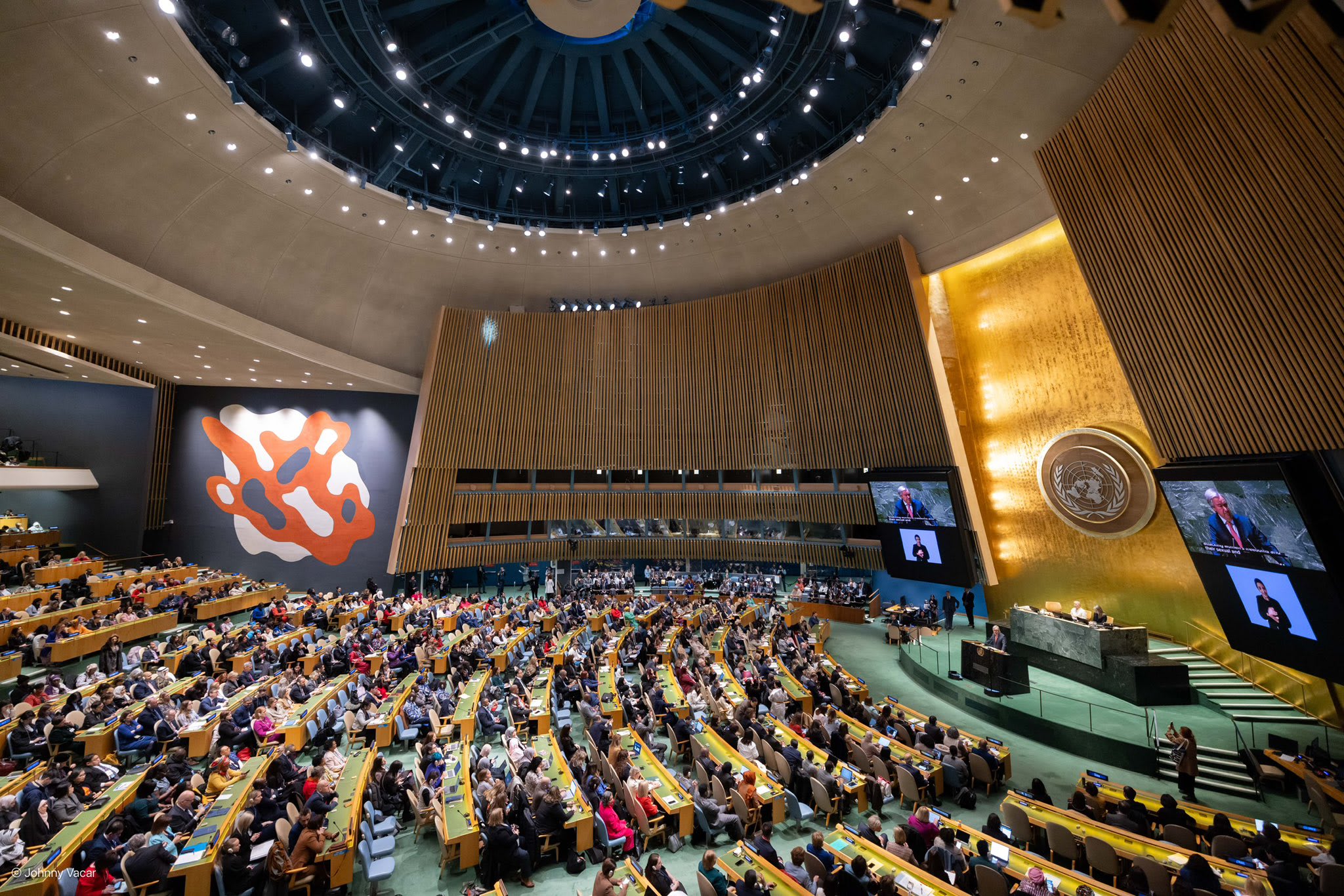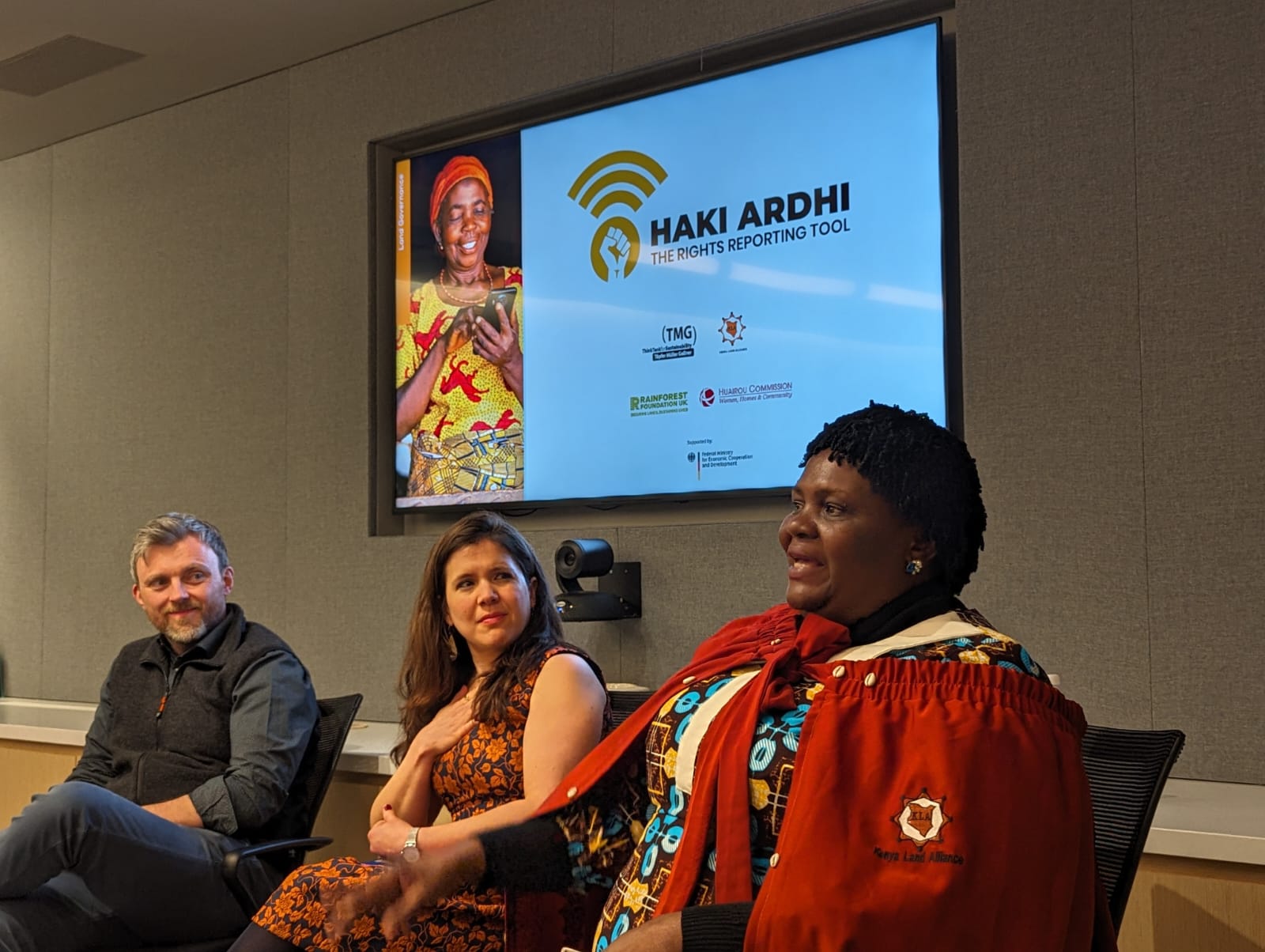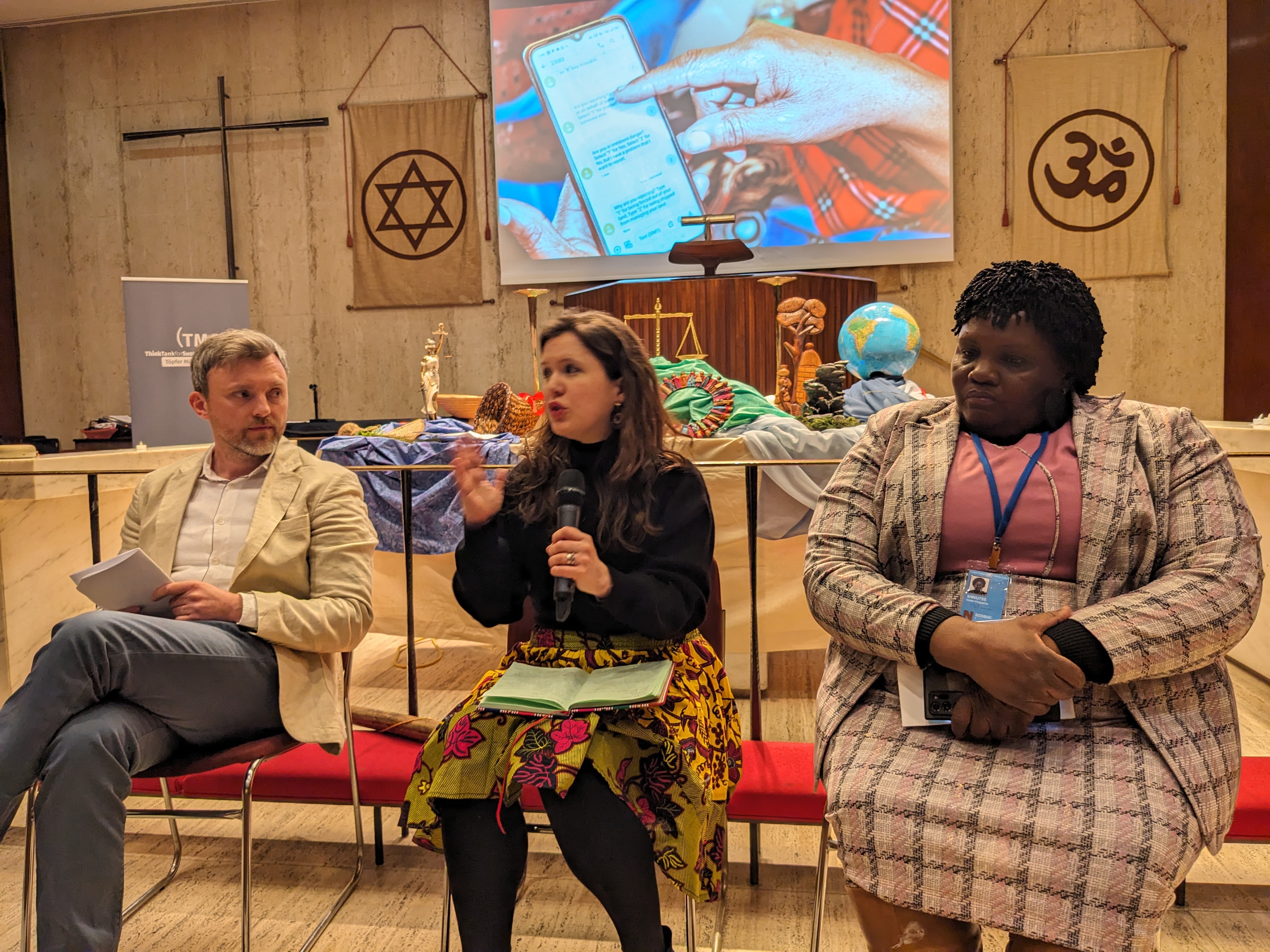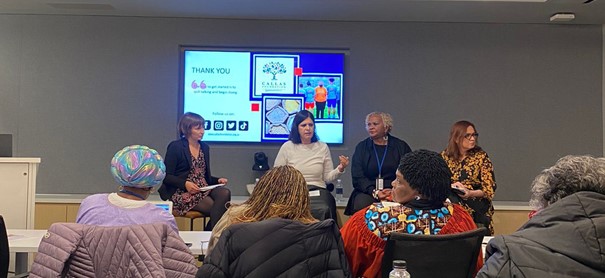Pioneering systems change: grassroots action forges gender-just pathways to accountability
The 68th session of the Commission on the Status of Women (CSW) focused on how to reform institutions that routinely exclude women and eliminate poverty
by Frederike Klümper, Nicole Paganini, Ilse Pelkmans, David Betge | 2024-04-02

“A backlash against gender equality is on the rise. Yet, women human rights defenders, youth, civil society, parliamentarians, and public servants are working to push forward for gender equality in their communities and countries.”
Sima Bahous, Executive Director of UN Women
Navigating the backlash: forging gender-just pathways to accountability
The 68th session of the Commission on the Status of Women (CSW) took place between 11 and 22 March in New York City. The event gathered participants from around the world to collectively accelerate the achievement of gender equality and the empowerment of all women and girls. In particular, the event focused on both how to reform institutions that routinely exclude women and eliminate poverty. Key to this event was ensuring that all solutions incorporated a gender-just perspective, wherein differences in power, status and discrimination are incorporated to inform meaningful change.
The event took place amid 2023’s backlash against women’s rights organizations, who reported facing harassment, smear campaigns and false accusations, and even receiving death threats (Kvinna, Kvinna, 2023). In addition, a cascade of intersecting global crises rang the message clear: no crisis is gender neutral.
Women face a heightened risk of gender-based violence and food insecurity. For example, during conflict, women suffer from a higher likelihood of forced displacement and gender-based violence. And as of 2023, an estimated 736 million women and girls experienced physical or sexual violence (UN Women). In addition, although 50-80% of women produce the world’s food, they face greater impacts from climate shocks that decrease water supply and crop yields (UN). This erodes their food security and income. And unlike men, there are fewer work prospects in which women can participate as heat increases (UN). Standing on a demoralising horizon, the UN predicts that by 2030, 1 in 4 women and girls will face moderate to severe food insecurity.
“The intersection of food insecurity and gender-based violence underscores the need for disaggregated data to inform effective responses and achieve gender justice.” Nicole Paganini, TMG Research
The starting point
Despite international mandates, progress toward gender equality has stalled due to a glacial change in social norms that perpetuate discrimination (UNDP 2023), and women and girls continue to face both challenges meeting basic needs and heightened vulnerability. Persisting resistance to gender equality, emphasizes the urgency of protecting fundamental freedoms within democratic frameworks, particularly for women and other marginalized groups.
But overcoming these barriers and achieving gender equality requires efforts beyond state institutions or multilateral forums. It requires a redefinition of the starting point.

Violet Shivutse, Chair and Africa Regional Representative of the Huairou Commission at CSW’s event organized by UNCDF and UN-Habitat on the power of women’s leadership at community level @TMG Research
“How can local governments be a bridge between national governments and grassroots, feminist organizations that are leading important work on gender equality?” Dr. Jemimah Njuki, UN Women
TMG at CSW68: bridging grassroots solutions and government obligations for gender justice and social empowerment
Institutions across all levels play a vital role in achieving gender equality and the empowerment of all women and girls. But who gets to shape how institutions evolve?
It is increasingly evident that grassroots action has the power to bring about powerful systems change. That’s why TMG works to ensure that grassroots organizations are both recognised as the starting point for meaningful change and receive the support they need to build on local solutions that meet their needs. Indeed, by harnessing the momentum women-led grassroots action creates, women have a better chance of actively shaping political outcomes and stakeholders at all levels are better placed to craft transformative, gender-responsive policies that reflect their needs.
In the spotlight
At CSW68, TMG embraced this perspective over the course of our four events and added to it a collage of voices from across the political spectrum.
Together with our partner organizations, Shibuye, FACT, SCAT, Callas Foundation and the Rainforest Alliance UK, as well as alongside guests from UN Women, Heinrich Boell Foundation, the Clooney Foundation for Justice, the World bank, the Food and Agriculture Organization, the Global Alliance for Care, Huairou Commission and Rainforest Foundation US, we explored gender-just pathways to address food insecurity, land rights, gender-based violence and accountability mechanisms that promote women’s inclusion, economic and social empowerment, and stronger social protection measures.
In orchestra, we demonstrated that organised grassroots actors and local innovations supported by international partners can contribute to increasing accountability of powerholders, strengthening civil society structures and forging partnerships and collaborations that transcend different levels of policymaking and thematic silos.
We showcased two innovative solutions borne out of women-led grassroots organizations in Kenya and South Africa that effectively support women to protect themselves from hunger, poverty and violence and improve their access to justice.
“When we speak about the ‘missing middle’, we have to acknowledge that the work of grassroots organisations is precisely that critical middle.” Joanne Harding, SCAT
Haki Ardhi – a women’s land rights reporting tool shifting power dynamics
Women's land rights are fundamental to economic empowerment, social justice and climate resilience. But they are highly disputed, impacting countless women worldwide. With climate change exerting mounting pressure on land use and a related upsurge in land-intensive measures, such as carbon markets, violations of women’s tenure rights are increasing. This often results in gender-based violence, and severely impacts food security and livelihoods.
In response to these challenges, TMG alongside its partners, the Kenya Land Alliance (KLA) and Rainforest Foundation UK, and in collaboration with Shibuye Community Health Workers, Taita Taveta Human RightsWatch, and Sauti Ya Wanawake, developed an accessible, decentralized digital rights reporting tool called, Haki Ardhi, that enables women in Kenya to safely report tenure rights infringements to local, community-based support actors, as well as to KLA. Near real time data on rights violations allow these organizations to respond immediately and support women through mediation, legal aid and advocacy.
Reflecting on the Haki Ardhi Tool and its implementation so far, we can see its transformative potential in addressing land rights violations. For example, grassroots organizations transformed its data into advocacy, moving local authorities to promote land lease guidelines as an effective means to secure women’s land access.
Beyond providing access to justice, initiatives like this – which are underpinned by grassroots efforts – can catalyse the formation of empowered women's movements capable of holding governments accountable for protecting their rights and shaping gender-just policies.

Haki Ardhi partners (TMG Research, RFUK, KLA/Shibuye Community Health Workers) and Huairou Commission at CSW’s event Social Digital Tools Safeguarding Women’s Land @ TMG Research
Women-led community kitchens in South Africa step in where social protection falls short
In South Africa, the COVID-19 pandemic highlighted the fact that the constitutional mandate of state entities to realize the right to food and nutrition is not supported by policy or budget allocations.
To meet needs, community kitchens in Cape Town – largely run by women volunteers who contribute their own resources – stepped up to relieve people living in informal and low-income areas of hunger. They cooked and distributed thousands of meals per week. Not only did they meet food needs, they also served as safe havens for people escaping rising gang violence and gender-based violence.
Through TMG’s research and network-building, community kitchens became transformative spaces that effectively address the intertwined challenges of gender-based violence and food security. For example, TMG worked with women to co-design and implement six new models – such as utilising greenhouses, bulk purchases and obtaining government funding – to bolster food security and livelihoods.
Now, alongside our partner FACT, we are piloting community-driven knowledge generation through (digitally) collecting and processing data on food insecurity and coping strategies in Cape Town. This data addresses critical knowledge gaps and renders visible key challenges faced by communities in their day-to-day struggle to cope with hunger, energy shortages, violence and food price spikes.
This project also utilises a social accountability campaign to advocate for integrating community kitchens into a long-term government programme. Part and parcel to this campaign are targeted learning journeys crafted for decision makers involved in the assessment process to facilitate its integration.

Partners of community kitchens in South Africa (TMG Research, Böll Foundation South Africa, Callas Foundation and UN Women) at CSW’s event The Nexus of Food Security, GBV & Addiction @TMG Research
From here, where to? A call to action for UN Women
These initiatives in Kenya and South Africa demonstrate the transformative impact of community-owned data in holding governments accountable and driving meaningful change.
As an outcome of the four events, stakeholders agreed on the need to both invest and believe in the power of grassroots organizations and their experience in holding duty-bearers accountable. In addition, consensus was reached on ways to ensure women can meaningfully participate in shaping responses to crises to drive inclusive and effective solutions.
TMG is therefore committed to:
Supporting community-led structures and institutions through digital and social innovations that guide governments in crafting evidence-based, gender-transformative policies and budgets.
Building on and integrating (informal) local innovations that effectively protect women’s rights.
Fostering interactions between grassroot women and governments at local, national and global levels.
Improving government’s crisis-response mechanisms to alleviate community burden and ensure care reaches the most vulnerable.
Scaling up the impact of local solutions and supporting structural changes that bring about an enabling environment.
With this road map, we can improve accountability and fill in the “missing middle” between grassroots actions and government obligations; between grassroots efforts and the political attention and financial support needed to sustain and scale them up. Only by taking grassroots organizations as the starting point can we achieve necessary structural change and realise women’s rights on a global scale.
 Urban Food FuturesFeb 09, 2026
Urban Food FuturesFeb 09, 2026Pushing the horizon: Urban farming and community-led innovation in Mukuru informal settlement
A small community-run greenhouse in Mukuru is offering insights into how controlled-environment agriculture can strengthen food security in urban environments under increasing pressure—and a look into the future of food systems in informal settlements.
Christian Sonntag, Emmanuel Atamba, Lumi Youm
 Land GovernanceDec 18, 2025
Land GovernanceDec 18, 2025Land tenure, women’s land rights, and resilience: Reflections from CRIC23 toward UNCCD COP17
Our experts discuss what the exchanges at CRIC23 highlighted and revealed about the role of secure and gender-equitable land tenure in the UNCCD's work ahead of the 2026 triple COP year.
Frederike Klümper, Washe Kazungu
 Urban Food FuturesDec 09, 2025
Urban Food FuturesDec 09, 2025The story of Mukuru's Urban Nutrition Hub
In Mukuru informal settlement, a safe haven for women has grown into the Urban Nutrition Hub, a multi-purpose space for nutrition education, training, and community development, demonstrating the potential of grassroots community-owned innovation..
Serah Kiragu-Wissler


